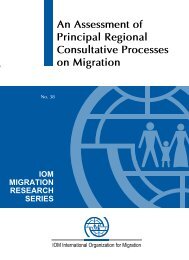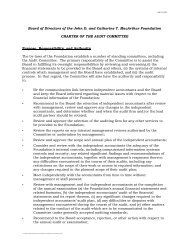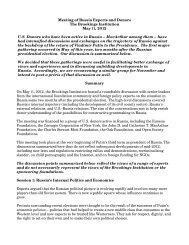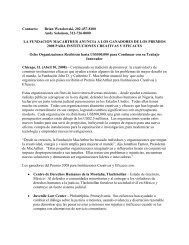A Global Compact on Learning - Brookings Institution
A Global Compact on Learning - Brookings Institution
A Global Compact on Learning - Brookings Institution
You also want an ePaper? Increase the reach of your titles
YUMPU automatically turns print PDFs into web optimized ePapers that Google loves.
3<br />
PRIORITY 2: EMPHASIZING LITERACY AND<br />
NUMERACY IN LOWER PRIMARY EDUCATION<br />
The abilities to read, write, and do mathematics are<br />
foundati<strong>on</strong>al skills for all future learning. Ensuring<br />
children master these skills is another essential comp<strong>on</strong>ent<br />
of addressing the learning crisis. Not <strong>on</strong>ly will<br />
it reduce the number of children dropping out and<br />
pave the way for their <strong>on</strong>going learning success, it is<br />
cost-effective by reducing inefficiencies in the educati<strong>on</strong><br />
system.<br />
Literacy skills in the lower primary grades, 112 in<br />
particular, have been shown to be a good predictor<br />
of later educati<strong>on</strong>al success, and children who gain<br />
reading fluency during lower primary are unlikely<br />
to lose it even if they drop out. 113 Many studies have<br />
documented the relati<strong>on</strong>ship between failure to learn<br />
to read and falling further behind each year or dropping<br />
out altogether. Regardless of the specifics of any<br />
given language, research shows that the trajectory of<br />
a child’s reading progress at the end of grade <strong>on</strong>e can<br />
predict his or her skills at the end of primary school<br />
because reading skills are self-reinforcing (i.e., str<strong>on</strong>g<br />
readers acquire double the vocabulary, which builds<br />
reading skills, than do weak readers). 114 Early learning<br />
success in reading, writing, and mathematics also<br />
c<strong>on</strong>tributes to higher retenti<strong>on</strong> rates because children<br />
who are successful early <strong>on</strong> are more likely to remain<br />
in school l<strong>on</strong>ger. 115 This link is particularly important<br />
for low-income girls, who remain the most educati<strong>on</strong>ally<br />
marginalized. Evidence-based strategies to<br />
build foundati<strong>on</strong>al skills in literacy and numeracy in<br />
lower primary grades are discussed in this chapter.<br />
Critical thinking —the ability to find and analyze informati<strong>on</strong><br />
to inform decisi<strong>on</strong>s—is an essential and<br />
interlinked comp<strong>on</strong>ent of improving learning outcomes.<br />
Reading, writing, and mathematics are tools<br />
for acquiring knowledge and therefore are foundati<strong>on</strong>al<br />
to becoming a critical thinker; however, critical<br />
thinking skills are also expanded through other<br />
means, including, but not limited to, promoting citizenship<br />
and developing social and emoti<strong>on</strong>al competence.<br />
116 In 2010, Pratham’s Annual Status of Educati<strong>on</strong><br />
Report in India introduced critical thinking<br />
questi<strong>on</strong>s for children in grade 5 and above by asking<br />
questi<strong>on</strong>s that impact “everyday” living (i.e., work<br />
with m<strong>on</strong>ey, calendars, area, and estimati<strong>on</strong>) based<br />
<strong>on</strong> simple mathematical operati<strong>on</strong>s used frequently<br />
at that schooling level. Colombia has implemented<br />
a policy <strong>on</strong> nati<strong>on</strong>al citizenship competencies to<br />
promote the development of resp<strong>on</strong>sible, active, and<br />
peaceful citizens that include c<strong>on</strong>flict resoluti<strong>on</strong>, mutual<br />
decisi<strong>on</strong>making, respect and defense of human<br />
rights and understanding of plurality, identify and<br />
value of differences. Although attenti<strong>on</strong> to critical<br />
thinking is evident in pockets of research, it has not<br />
been analyzed to the same extent that literacy and<br />
numeracy in the lower primary grades have been.<br />
Given the smaller research base from which to draw<br />
specific strategies and activities to improve learning<br />
outcomes, the immediate way forward <strong>on</strong> elevating<br />
a focus <strong>on</strong> critical thinking to improve learning is<br />
through increasing research, particularly at the primary<br />
level, of how critical thinking skills are introduced<br />
and assessed in a classroom setting.<br />
All these factors lead to Priority 2:<br />
Priority 2: Build foundati<strong>on</strong>al skills in literacy and<br />
numeracy in the lower primary grades.<br />
Figure 3.1 portrays the various aspects of Priority 2,<br />
which should be addressed with these two strategies:<br />
A <str<strong>on</strong>g>Global</str<strong>on</strong>g> Compa c t <strong>on</strong> <strong>Learning</strong>: Taking Acti<strong>on</strong> <strong>on</strong> Educat i o n in Developing Countries<br />
C e n t e r for Universal Educat i o n at <strong>Brookings</strong><br />
23






